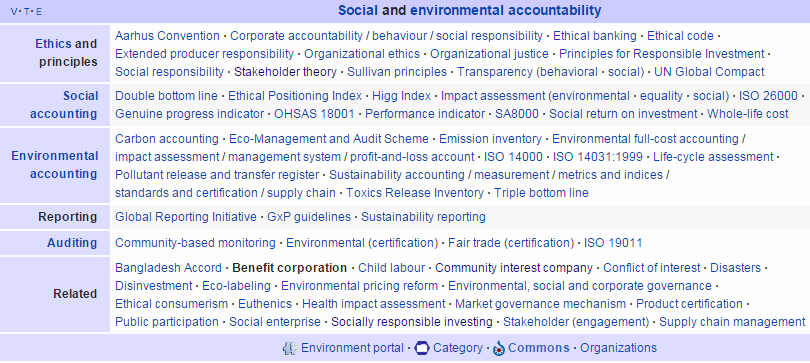B Corporation: Difference between revisions
Siterunner (talk | contribs) No edit summary |
Siterunner (talk | contribs) No edit summary |
||
| (7 intermediate revisions by the same user not shown) | |||
| Line 1: | Line 1: | ||
<big>'''Public Benefit Business'''</big> | |||
* '''http://en.wikipedia.org/wiki/Benefit_corporation''' | |||
* '''http://www.benefitcorp.net/state-by-state-legislative-status''' | |||
''A benefit corporation or B-corporation is a type of for-profit corporate entity, legislated in 28 U.S. states, that includes positive impact on society and the environment in addition to profit as its legally defined goals. B corps differ from traditional corporations in purpose, accountability, and transparency, but not in taxation. | |||
''The purpose of a benefit corporation includes creating general public benefit, which is defined as a material positive impact on society and the environment. A benefit corporation’s directors and officers operate the business with the same authority as in a traditional corporation but are required to consider the impact of their decisions not only on shareholders but also on society and the environment. In a traditional corporation, shareholders judge the company's financial performance; with a B-corporation, shareholders judge performance based on how a corporation's goals benefit society and the environment. Shareholders determine whether the corporation has made a material positive impact. | |||
''Benefit corporation laws address concerns held by entrepreneurs who wish to raise growth capital but fear losing control of the social or environmental mission of their business. | |||
Social | <big>'''More re Business & Social Responsibility'''</big> | ||
Community interest company | |||
* http://en.wikipedia.org/wiki/Community_interest_company | |||
http://www.greenpolicy360.net/w/B_Lab | Impact investing | ||
* http://en.wikipedia.org/wiki/Impact_investing | |||
Public-benefit corporation | |||
* http://en.wikipedia.org/wiki/Public-benefit_corporation | |||
Socially responsible investing | |||
* http://en.wikipedia.org/wiki/Socially_responsible_investing | |||
Stakeholder theory | |||
* http://en.wikipedia.org/wiki/Stakeholder_theory | |||
Social Purpose Corporation | |||
* http://en.wikipedia.org/wiki/Social_Purpose_Corporation | |||
°°°°°°°°°°°°°°°°°°°°°°°°°°°°°°°°°° | |||
<big>'''Benefit Corporations, Alternatives to Business-as-Usual'''</big> | |||
* http://www.greenpolicy360.net/w/B_Lab | |||
Visit Socio-Economic Terms at Wikipedia for New Economics/Business | |||
| Line 34: | Line 60: | ||
[[Category: | |||
[[Category: | ° | ||
[[Category:Cooperatives]] | |||
[[Category:Corporate Accountability]] | |||
[[Category:Ecological Economics]] | |||
[[Category:Ecology Studies]] | |||
[[Category:Eco-nomics]] | |||
[[Category:Economics]] | |||
[[Category:Economic Development]] | |||
[[Category:Environmental Full-cost Accounting]] | |||
[[Category:Green Business]] | |||
[[Category:Green Politics]] | |||
[[Category:Labor Issues]] | |||
[[Category:New Economy]] | |||
[[Category:Sharing Economy]] | |||
[[Category:US]] | |||
[[Category:Workers Rights]] | |||
Latest revision as of 03:10, 9 July 2018
Public Benefit Business
A benefit corporation or B-corporation is a type of for-profit corporate entity, legislated in 28 U.S. states, that includes positive impact on society and the environment in addition to profit as its legally defined goals. B corps differ from traditional corporations in purpose, accountability, and transparency, but not in taxation.
The purpose of a benefit corporation includes creating general public benefit, which is defined as a material positive impact on society and the environment. A benefit corporation’s directors and officers operate the business with the same authority as in a traditional corporation but are required to consider the impact of their decisions not only on shareholders but also on society and the environment. In a traditional corporation, shareholders judge the company's financial performance; with a B-corporation, shareholders judge performance based on how a corporation's goals benefit society and the environment. Shareholders determine whether the corporation has made a material positive impact.
Benefit corporation laws address concerns held by entrepreneurs who wish to raise growth capital but fear losing control of the social or environmental mission of their business.
More re Business & Social Responsibility
Community interest company
Impact investing
Public-benefit corporation
Socially responsible investing
Stakeholder theory
Social Purpose Corporation
°°°°°°°°°°°°°°°°°°°°°°°°°°°°°°°°°°
Benefit Corporations, Alternatives to Business-as-Usual
Visit Socio-Economic Terms at Wikipedia for New Economics/Business
°
